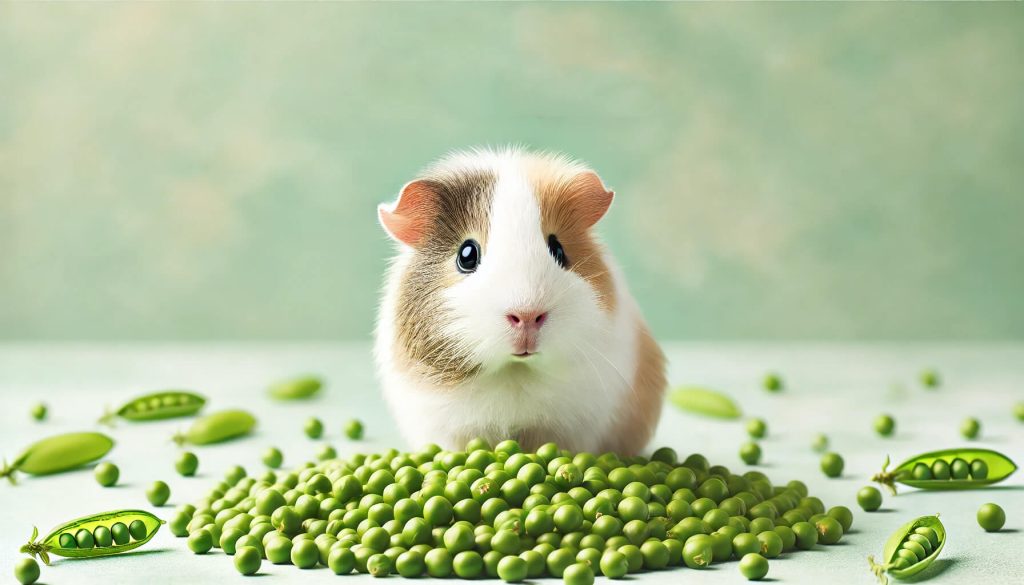
Can Guinea Pigs Eat Peas?
Understanding Guinea Pig Diet Basics
Guinea pigs have unique dietary needs crucial for their health. Knowledge of what constitutes a balanced diet greatly impacts your guinea pig’s well-being.
The Importance of a Balanced Diet
A balanced diet keeps your guinea pig healthy and energetic. Their diet should primarily consist of hay, which aids in digestion and prevents dental problems. Fresh vegetables and fruits can supplement the diet, offering crucial vitamins and minerals. Always ensure the dietary choices support their nutritional needs to avoid deficiencies and health issues.
- Hay: Timothy hay is recommended and should be available at all times. It provides necessary fiber and aids in maintaining optimal dental health.
- Fresh Vegetables: Leafy greens, bell peppers, and carrots offer essential vitamins. Ensure variety to prevent nutrient imbalances.
- Fresh Fruits: Treats like apples and blueberries provide vitamins. Limit quantity due to high sugar content.
- Pellets: Choose guinea pig-specific pellets fortified with Vitamin C. Only a small portion of their diet should consist of pellets to prevent overfeeding.
- Water: Fresh, clean water must always be available. Regularly check and refill their water supply.
Following these guidelines guarantees your guinea pig receives the right mix of nutrients for a healthy and active life.
Can Guinea Pigs Eat Peas?
Guinea pigs can eat peas in moderation, adding nutritional variety to their diet. However, understanding the benefits and potential risks are crucial.
Nutritional Benefits of Peas
Peas offer essential vitamins and minerals. Vitamin C supports guinea pigs’ immune systems, as they can’t produce it themselves. Peas also provide Vitamin K, which aids in blood clotting, and fiber, essential for digestion. Giving peas occasionally can enhance their nutritional intake.
Potential Risks and Considerations
Overfeeding peas may lead to digestive issues. High sugar content can cause obesity and dental problems. Introduce peas gradually, monitoring for any adverse reactions. Avoid canned peas due to added salt or preservatives. Fresh, raw peas are the safest option.
Stay informed about your guinea pigs’ diet to ensure their health.
Serving Peas to Guinea Pigs
Guinea pigs can enjoy peas as a part of their balanced diet. Understanding the right way to introduce and serve peas to your guinea pigs are essential for their health.
How to Properly Prepare Peas
First, use fresh, raw peas rather than canned or frozen ones, as these can contain added salt, sugar, or preservatives harmful to guinea pigs. Rinse the peas thoroughly to remove any dirt or pesticides. Avoid cooking the peas, as guinea pigs digest raw vegetables better. Ensure each pea is free from mold or spoilage before serving.
Recommended Serving Size and Frequency
Offer peas in moderation as an occasional treat. For adult guinea pigs, provide up to 1 tablespoon of peas 1-2 times per week. Monitor your guinea pig’s reaction when introducing peas, checking for any digestive issues. Limit the serving size to prevent potential problems such as bloating or diarrhea, ensuring peas complement rather than replace the core components of their diet.
Alternative Foods for Guinea Pigs
Guinea pigs thrive on a balanced diet. Incorporating a variety of foods ensures they receive essential nutrients.
Safe Vegetables and Fruits
Guinea pigs benefit from multiple nutritious vegetables and fruits. Offer bell peppers, cucumbers, and spinach for plenty of vitamins and minerals. Leafy greens like kale and romaine lettuce support overall health. Introduce sources of Vitamin C like oranges, strawberries, and kiwi. Always remove seeds and avoid citrus peels.
| Safe Vegetables | Safe Fruits |
|---|---|
| Bell peppers | Oranges (seedless) |
| Cucumbers | Strawberries |
| Spinach | Kiwi (peeled) |
| Kale | Apples (without seeds/core) |
| Romaine lettuce | Blueberries |
Foods to Avoid in a Guinea Pig’s Diet
Some foods pose risks to guinea pigs. Avoid high-sugar and high-fat foods like chocolate and dairy products. Never feed onions, garlic, or chives due to their toxicity. Steer clear of the following vegetables and fruits as they contain harmful substances or pose choking hazards: iceberg lettuce, avocados, and any citrus peels. Excessive calcium from foods like spinach or kale in large amounts may lead to urinary issues, so balance their intake.
By focusing on safe vegetables and fruits while avoiding harmful options, you ensure your guinea pig’s optimal health and well-being.
Conclusion
Feeding peas to your guinea pig can be beneficial when done in moderation. Always opt for fresh peas and avoid canned or frozen ones. Remember to provide a variety of safe vegetables and fruits, like bell peppers and cucumbers, to ensure your guinea pig gets essential nutrients. Avoid high-sugar, high-fat foods, and toxic items to keep your pet healthy. A balanced diet is key to maintaining your guinea pig’s well-being.
